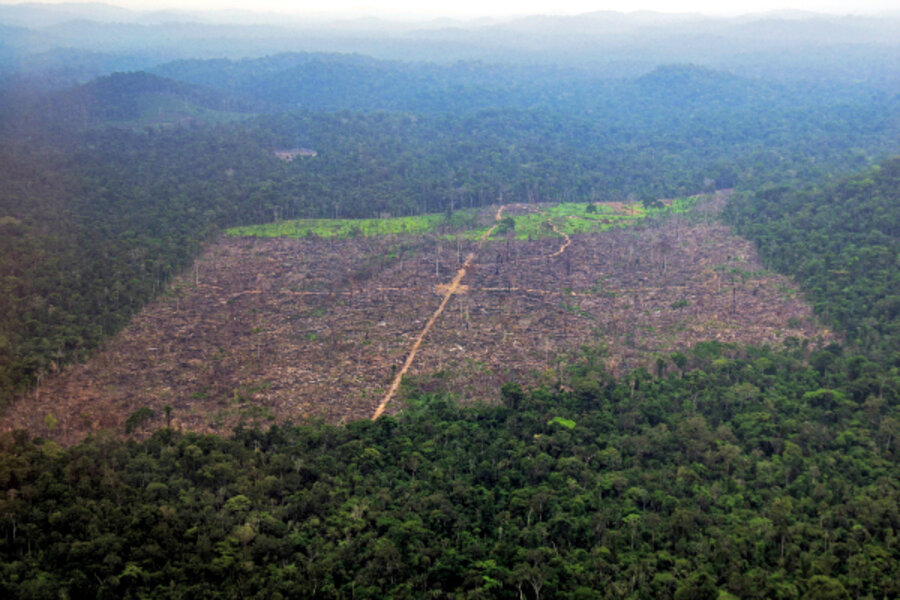How better-trained farmers slow Brazil's deforestation
Loading...
In Para, Brazil, farmers are turning a profit and the government is on track to slow deforestation thanks to local nonprofit Imazon, which got them to work together.
By 2003, Brazil was on the verge of an environmental catastrophe. As its economy expanded, cattle ranchers needed more land to graze their livestock, and few laws prevented them from burning down thousands of square kilometers of untitled land in the Amazon, causing vast environmental damage.
In the worst regions, like Para, widespread poverty meant that stopping deforestation was at the bottom of the government’s list, despite massive efforts by groups like Greenpeace and Imazon.
A wave of environmental laws passed by the federal government from 2004 to 2008 seemed to complicate things for local governments and economies, even as deforestation rates fell. Many municipal governments couldn’t fully meet government targets under the new regulations but faced economic sanctions if they didn’t. A beef embargo prevented farmers from selling their meat to mainstream supermarket chains like Carrefour and Walmart if their municipality ended up on a blacklist for failing to reduce illegal deforestation to government-mandated levels. The government confiscated herds and sawmills from the law’s offenders.
When Paragominas, a municipality in Para where Imazon worked, was placed on the list, 2,300 jobs and all the municipality’s federal agricultural credits disappeared within a year.
Imazon found itself helping save the local economy. It created a training program for the local government to learn how to use satellite technology to track deforestation. Since most of the affected land wasn’t titled, Imazon also helped farmers formalize their land titles and trained them in improved farming techniques, like rotating crops and limiting overgrazing, to make their land more productive and reduce the need to cut down more rainforest.
It worked. Farmers trained in better methods required less land to turn a profit, so they cut down fewer trees.
In just a few years, Imazon’s program in Paragominas helped to reduce illegal deforestation by more than 80 percent. When farmers in Paragominas implemented Imazon’s training techniques, most saw their incomes increase, even as they stopped clearing additional land.
Inspired by the success of the program, the state government decided to launch its own Green Municipalities Program in 2011, essentially promoting Imazon’s collaborative approach in Paragominas at a state level. Now, more than 94 of Para State's 143 municipalities have signed onto the Green Municipalities Program, and both the state government and Imazon are straining to meet the demand.
However, a new breakthrough came when Imazon attracted the attention of the Investment Innovations Alliance, a new partnership between Mercy Corps, USAID, and the Skoll Foundation. This April at the Skoll World Forum, the partners announced their first grant of $3.4 million, complementing an earlier $2.6 million from Skoll.
The funding will support Imazon to scale the successes in Paragominas across the state of Para. The project has ambitious goals, as the government has promised to reduce deforestation by 80 percent over the next seven years.
By systematizing the training process, the alliance hopes to leave the state government capable of responding to the growing demand from farmers and municipal governments who have seen Imazon’s programs work in Paragominas.
The question is how Imazon can show its methodologies work. Mercy Corps will help Imazon to test its approach in 10 municipalities serving as guinea pigs, drawing from its own network of experts in impact analysis.
But Imazon’s biggest success may be its ability to get locals on board with its ideas. 94 municipalities have already signed on to reducing deforestation through the Green Municipalities Program, and Cameron Peake, Mercy Corps's director of social innovations special initiatives, says she’s impressed at how the nonprofit has persuaded the local farmers and government that environmental sustainability, economic growth, land rights, and good governance can actually go together.
And that achievement, for one, is too valuable to put a number on.
This article originally appeared at Global Envision, a blog published by Mercy Corps.





